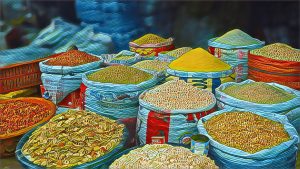In a striking reflection of the economic challenges faced by Nigerians, staple foods such as rice and pasta have seen sales plummet to a five-year low, as rampant inflation renders these essentials less accessible to the populace. This alarming trend is highlighted in a recent report by Euromonitor International, which reveals a marginal decline in sales volume within the formal market for the second consecutive year, dropping to 2.57 million tonnes in the previous year from 2.47 million tonnes in 2022.
The report, titled ‘Staple Foods in Nigeria,’ paints a grim picture of the current state of affairs, where even essential food items are not immune to the adverse effects of the country’s economic downturn. The analysis indicates that both retail and food service volume sales of staple foods dipped in 2023, despite their critical role in local diets.
Nigerians are increasingly finding themselves in dire straits, with poor economic conditions, sky-high inflation, and limited consumer spending power leading many to ration their food intake or turn to unpackaged substitutes. Social gatherings, which significantly contribute to food demand, have also seen a decline due to the weakened purchasing power of consumers.
The report further breaks down the data, showing significant drops in the consumption of various food categories, including breakfast cereals, processed fruit and vegetables, and processed meat, seafood, and meat alternatives. More niche categories considered less essential, such as cakes and frozen processed potatoes, have experienced even steeper declines.
Personal accounts from Nigerians like Iyanuoluwa Fadairo, a trader based in Ogun, and Brilliant Akpedafe, a Lagos-based production technician, underscore the harsh realities of the situation. Fadairo has had to cut her family’s daily meals to two, while Akpedafe expresses shock at the soaring prices of food items like chicken and fish.
The inflation rate in Nigeria, Africa’s largest economy, has surged to an 18-year high over the past seven months, driven by government reforms such as the removal of petrol subsidies and currency devaluation. The National Bureau of Statistics (NBS) reported a rise in inflation to 28.2 percent in November of the previous year, with food prices being a significant contributor to this increase.
The World Bank’s latest Nigeria Development Update report reveals that the number of people living in poverty in Nigeria rose to 104 million in 2023, up from 89.8 million at the beginning of the year. This staggering increase of 14.2 million people falling into poverty highlights the devastating impact of inflation, particularly on the poor and vulnerable.
Despite these challenges, the Nigerian government has initiated targeted cash transfers to alleviate some of the burdens on the most vulnerable households. However, a comprehensive approach to curbing inflation, including tighter fiscal and monetary policies, is essential.
Looking ahead, the Food and Agricultural Organization, World Food Program, and other organizations project that staple food prices in Nigeria and across the West Africa region will continue to rise in 2024. Factors contributing to this trend include production deficits, trade restrictions, insecurity in the Sahel, elevated global prices, high transaction costs, and currency depreciation in coastal countries.
As Nigerians navigate these trying times, there remains a glimmer of hope that concerted efforts by the government and international organizations will pave the way for economic recovery and stability.


